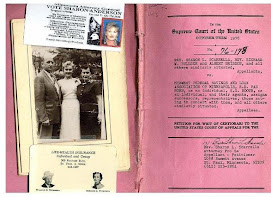Postbulletin.com: Rochester, MN
Key panel named in Minnesota Senate recount
Associated Press
ST. PAUL -- The jury that will rule on disputed ballots in the Minnesota Senate recount includes the Democratic secretary of state, two Supreme Court justices appointed by a Republican governor and two district judges whose politics are harder to gauge.
The five-member canvassing board holds enormous sway over the outcome of the race between Republican Sen. Norm Coleman and Democrat Al Franken. Coleman currently leads by 206 votes out of 2.9 million -- a margin of seven-thousandths of 1 percent, small enough to trigger an automatic recount.
The board meets Tuesday to certify the machine-counted tally before officially ordering the manual recount that will start the next day. A month later, the panel will reconvene to determine the fate of ballots challenged during the recount.
The board's members are Democratic Secretary of State Mark Ritchie; Supreme Court Chief Justice Eric Magnuson and Justice G. Barry Anderson, both appointed by GOP Gov. Tim Pawlenty; and Ramsey County Chief Judge Kathleen Gearin and her deputy, Judge Edward Cleary.
Gearin rose to the bench in a nonpartisan election in 1986. Cleary was appointed in 2002 by then-Gov. Jesse Ventura, an Independence Party member.
State law gives Ritchie authority to fill out the judicial slots on the board within certain parameters, but he said he accepted recommendations by Magnuson and Gearin. At a news conference Wednesday, Ritchie downplayed the political ties of canvassing board members, including himself.
"When they put on the robe, they stop being of a political party and they start being servants of the people of Minnesota and I feel the same way when I took the oath of office and walked through the door," Ritchie said.
He added, "I can promise you and the citizens that this is going to be run in an extraordinarily nonpartisan way."
Fritz Knaak, Coleman's lead lawyer, said he was comfortable with the board's makeup.
"The people of this state should feel good about who's on the panel," he said.
Franken spokesman Andy Barr jabbed at Coleman supporters who have raised questions about Ritchie's impartiality.
"I think we can all now see that their claims were just political posturing," Barr said. "Today, Mark Ritchie has named two partisan Republican Supreme Court justices to the state canvassing board."
The individual decisions the canvassing board makes aren't subject to appeal, but the entire election could wind up in court if one side contests the outcome.
The recount action will be spread around the state. Ritchie's office has identified 74 recount sites and predicts that will grow to as many as 120 by next week.
On Wednesday, local election officials will start conducting the ballot-by-ballot count. With campaign observers and lawyers looking on, they'll sort the ballots into Coleman and Franken piles. Ballots for third-party candidates will wind up in a separate stack, along with those where voter intent can't be determined or those that had multiple votes for the race.
The campaigns can challenge ballots as well, although rules require them to state a basis for the challenge and bar them from making "automatic or frivolous" challenges.
The ballots that wind up in the challenged pile will come back to the canvassing board for review and determinations. That is scheduled to start Dec. 16.
There were 2.92 million estimated voters on Election Day, but 2.88 million recorded votes. Some voters may have intentionally skipped the race, but officials expect the hand count to show votes that the optical-scan machines didn't pick up.
Local elections officials are due to receive recount training this Thursday.
Depending on the size of the county, the local counts will take anywhere from a day to a couple of weeks. Some places won't start their count until Nov. 24.
The secretary of state's office wants all the local counts done by Dec. 5, although it stopped short of saying it was a hard deadline.
Joel Beckman, Dakota County's director of property records and licensing, said his staff is prepared to work into the weekend if necessary to finish its count of 226,000 ballots prior to Thanksgiving. He expects it to take five days.
Beckman suspects the process will draw a crowd -- aside from the observers the campaigns send out -- and he welcomes the spectators.
"We have absolutely nothing to hide," Beckman said. "I hope people come out to assure themselves that Minnesota's elections are open and honest and above board."
---
Sketches of the five members of the state canvassing board that will rule on disputed ballots in the U.S. Senate race recount between Republican Sen. Norm Coleman and Democrat Al Franken:
-- MARK RITCHIE: A Democrat, Ritchie took office as Minnesota's secretary of state in January 2007 after beating two-term Republican Mary Kiffmeyer with the backing of a national group pushing to elect Democratic secretaries of state. Ritchie, 56, has sought to increase Minnesota's already high voter turnout. He headed a national voter turnout campaign in 2004. Ritchie is a farm policy expert who headed an agricultural think tank for 20 years and worked as a policy analyst for the state Department of Agriculture.
-- ERIC MAGNUSON: A former law firm colleague of Republican Gov. Tim Pawlenty, Magnuson was appointed by Pawlenty to the Minnesota Supreme Court in June as its chief justice. Magnuson, 57, a noted appellate lawyer, sealed the governor's hold on the seven-member court as his fourth appointee. He worked with Pawlenty at the now-defunct Rider Bennett law firm and screened potential judicial appointees for Pawlenty from 2003 to 2008. Magnuson is viewed as a friend to social conservatives.
-- G. BARRY ANDERSON: A former attorney for the state Republican Party, Anderson has served on the state Supreme Court since Pawlenty put him there in 2004. Anderson, 54, served on the state Court of Appeals for six years and has declined partisan endorsements in his judicial elections. He was city attorney in Hutchinson, Minn., from 1987 to 1998. Anderson specialized in civil trials before his judicial career began.
-- KATHLEEN GEARIN: A former Ramsey County prosecutor who first won her seat on the county bench in a 1986 election, Gearin became chief judge a few months ago. Her partisan leanings are unclear. On Saturday, she ruled against Coleman's attempt to block 32 absentee ballots from being counted in the Senate race. Gearin played a key role in preparing the courts to process arrestees from September's Republican National Convention in St. Paul. She specialized in child and sexual abuse issues as a prosecutor.
-- EDWARD CLEARY: In 2002, Independence Party Gov. Jesse Ventura picked Cleary -- then the head of the organization that polices the state's lawyers -- for a spot on the Ramsey County bench. Cleary is now the county's assistant chief judge. Cleary, a former public defender, recently rejected a challenge to the contract for the new Interstate 35W bridge. He wrote a book on the First Amendment.
There are 0 comments - Display All Comments
There are currently no comments on this article.








